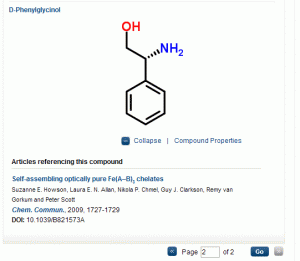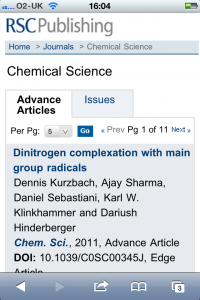RSC Publishing and its free database ChemSpider have integrated chemical semantic publishing across its chemical publications, and in collaboration with University of Manchester has made it accessible from the article PDF via the highly regarded Utopia Documents reader.
RSC Semantic Publishing
RSC has extracted chemical names from all its journal publications from 2008-2010 (over 30,000 articles), and has integrated the primary compounds of interest into ChemSpider. Readers of the article HTML on the RSC’s Publishing Platform can highlight compounds, and click on them to link directly through to ChemSpider’s compound record to discover additional data and compound information sources. The compounds will also shortly be visible from the article’s abstract page. Users of ChemSpider can discover these compounds via a text or structure search and, from a result, find the relevant references from RSC journal content and other integrated information sources. The project will run routinely on all new journal articles published by RSC and be extended further back into the RSC’s 170-year archive.
Integration with Utopia Documents
The free Utopia Documents reader can use this semantic information in the RSC’s enhanced articles to deliver this highlighting and linking functionality to RSC PDFs. Now readers of RSC PDF articles can use Utopia Documents to highlight and link from compounds directly through to ChemSpider and other information sources, thanks to the extension of Utopia by the software’s creators at The University of Manchester.
Richard Kidd, Informatics Manager at the RSC comments “expanding the integration of ChemSpider with our Publishing content, and applying routine semantic markup across ongoing and backfile content is a real milestone for how chemical science information can link together across the web. Being able to view all this through the PDF just makes it more accessible, and Utopia has continued to impress since it was first released.”
Steve Pettifer says, “Utopia Documents grew out of a need in the life sciences to regain some control of the mushrooming body of literature; it’s been really exciting for us to work with the RSC to expand into the field of chemistry and to bring our technology to a new audience.”
Example document to view the HTML and download a PDF:
Hydrogen bonding patterns in a series of 1-arylcycloalkanecarboxamides
Andreas Lemmerer and Joseph P. Michael, CrystEngComm, 2008, 10, 95-102
DOI: 10.1039/B708333E
Download Utopia Documents from getutopia.com
With this extension of semantic linking across our publications, RSC will now retire the use of the terms RSC Prospect & Project Prospect, used to describe the evolving project to enhance our articles which began back in 2007.
Both RSC and the Utopia Documents team are part of the Open PHACTS drug discovery consortium, which will be using the same technology to link disparate pharmacological data sources together under one view.












